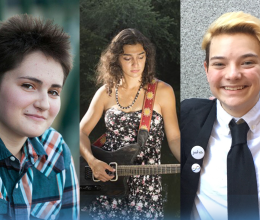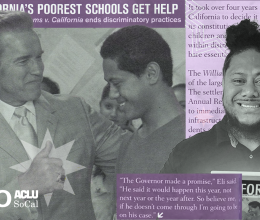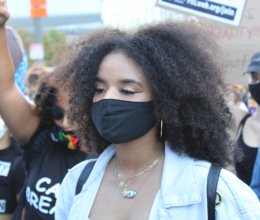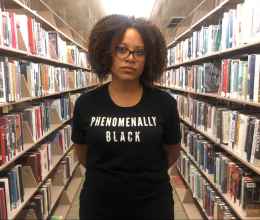
Today the ACLU of Southern California filed a civil rights class action lawsuit in California Superior Court on behalf of public high school students who are being denied equal and adequate access to AP courses. The ACLU/SC lawsuit (Daniel v. State of California) charges that the State of California is in violation of the Equal Protection Clause and the Education Clause of the California constitution. Under the California constitution, public education is a fundamental right making the State obligated to correct inequities in the school system. This first of its kind case represents a compelling example of denial of equal educational opportunities in the aftermath of Proposition 209. The State's failure to assure equal access to AP courses further perpetuates educational inequalities, particularly for students enrolled in lower income, predominantly African-American and Latino schools.
"California is flunking out when it comes to educating these students," said Mark Rosenbaum, ACLU/SC Legal Director. "This is a two-tiered educational system. In the face of its own data, with its eyes wide shut, California places hundreds of thousands of its children on uneven playing fields sodded with quicksand."
The AP program was developed more than 40 years ago by the College Board, a national not-for-profit educational organization, and is administered by the Educational Testing Services. The program allows qualified and motivated high school students to take college-level course material, culminating in an AP exam at the end of the year. Participation in the program serves several purposes. AP courses are traditionally more challenging and demanding than regular and honors courses, providing for greater intellectual and scientific development.
The completion of an AP course provides students with an extra point in the University of California's calculation of their grade point average (GPA) when considering admissions, allowing AP students to earn a GPA above a 4.0 "perfect score." Achieving a score of 3 or higher on an AP exam enables students to earn college credit, thereby reducing the cost of tuition and allowing students to opt out of certain introductory classes.
The high school student plaintiffs wish to take several AP courses throughout their academic career in the Inglewood Unified School District (IUSD). They are academically qualified and have expressed a desire to participate in the AP program.
Inglewood High School offers only 3 AP courses, but this problem is hardly isolated to Inglewood. For example, while Beverly Hills High School, whose student body is 76.6% white, offers 14 different AP subjects and 45 AP classes, Arvin High School, where 93.2% of the student body is African-American and Latino and of a lower income, offers only 2 AP courses. The suit argues that African-American and Latino students, and those from a lower income bracket, are being systematically marginalized from attending California's most prestigious public universities due to these glaring disparities. For example, in 1998, UC Berkeley rejected 8,000 applicants whose GPAs were 4.0 or higher, choosing to accept students with higher GPAs due to their enrollment in AP courses.
ACLU/SC staff attorney Rocio Cordoba said, "Although California has been in the forefront nationally in offering AP courses, such courses must be made equally available to minority and poor students who have the capacity and drive to achieve in higher education. There is no reason why such students should be denied the ability to compete equally for admission to California's elite universities, or to succeed in college degree programs, simply because their school did not provide an adequate AP program."







